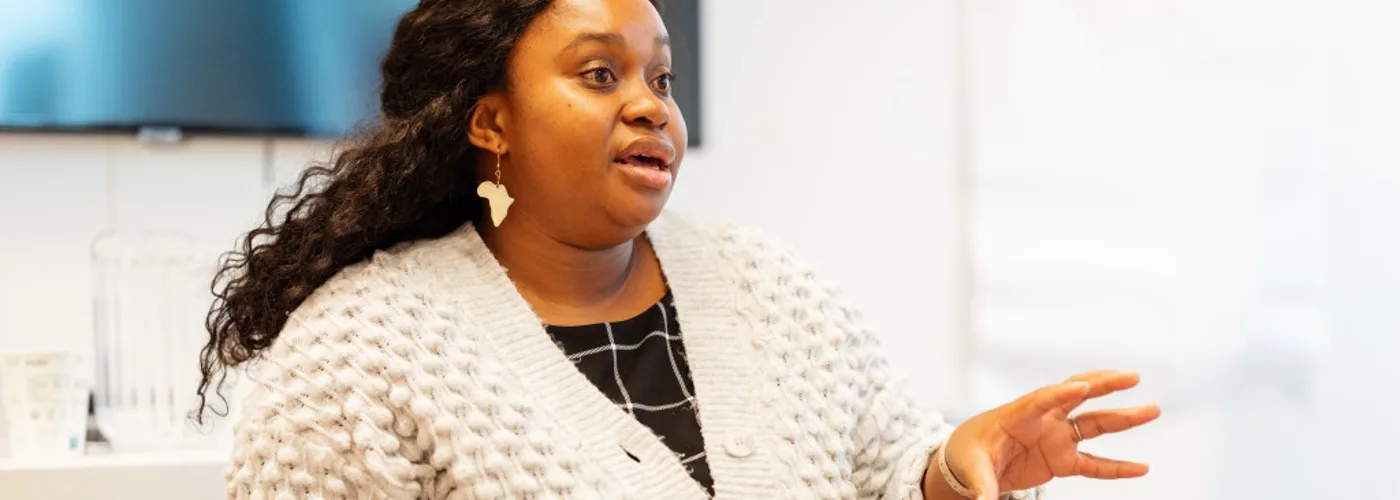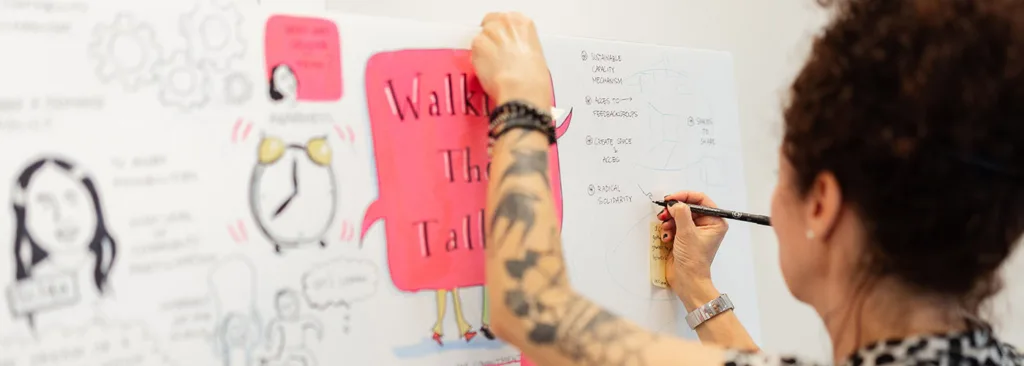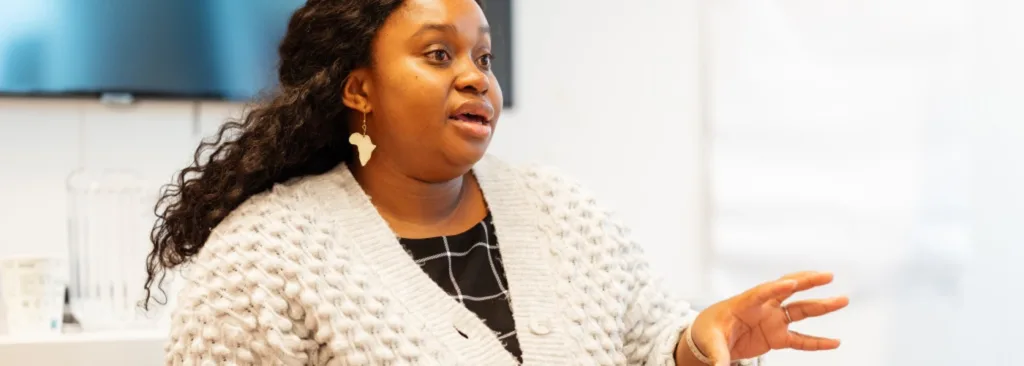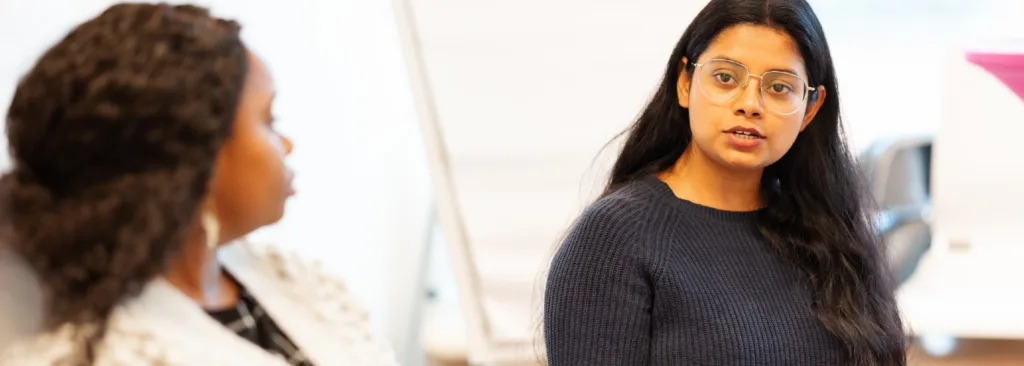On November 1 and 2, 2023, the Dutch Ministry of Foreign Affairs organized its Shaping Feminist Foreign Policy conference, gathering over 750 participants from all walks of life to discuss the ins and outs of a Feminist Foreign Policy (FFP). The day preceding the conference, civil society congregated at the FFP Community Festival co-hosted by the Dutch Gender Platform WO=MEN, Care, Cordaid and Hivos. Here, at the session Walking the Talk- centering Majority World voices and experiences in FFP monitoring and accountability, over 70 participants listened to amongst others Chido Nyaruwata. Chido is a young Zimbabwean feminist, digital storyteller, researcher and photographer. Walking the Talk’s program manager, Marinke van Riet, caught up with Chido after the events for a joint reflection.
Marinke van Riet (MVR): So, Chido, what were your key take-aways from the Community Festival and MFA Conference?
Chido Nyaruwata (CN): Let me start by saying that I found our Walking the Talk session at the Community Festival thought-provoking. Not only did I meet amazing feminists, like Indigenous women’s right activist Gilda Menchu Tzun from Guatemala, Restless Development’s board member, Pooja Singh from India and ISDAO’s Director Caroline Kouassiaman from Ivory Coast, but I also had the opportunity to debate the crucial role FFP can play in shaping our respective countries and multilateral spaces.
For me the critical question posed by our discussion was: What kind of feminism should guide our foreign policies? A truly transformative FFP cannot ignore or fail to address the intersecting systems of oppression that permeate international relations. The ongoing assault by Israel on the occupied Palestinian territory makes it evident that FFP countries have yet to fully grasp and address the structural causes of such conflicts. The opening remarks at the MFA conference by Maria al Abdeh of Women Now for Development resonated powerfully with me: “Feminists know that violence is a continuum. We need to analyze violence from a feminist lens to understand and solve the root causes of violence.”
MVR: You touch upon a sensitive issue that hung over both events like a dark cloud: the need to have a deep and honest conversation on what applying a feminist policy lens would mean for the political positions being taken by EU countries on the Israel-Palestine war, including the Netherlands. Despite Hivos’ statement calling for a ceasefire and the Walking the Talk panellists calling out the EU’s double standards, I regrettably did not use the opportunity to have an open conversation about this. During the MFA conference, activists staged a protest and prepared a statement, which fell on deaf ears considering the harsh closing speech (starting at 41:27) by the caretaker Minister of Foreign Affairs Hanke Bruins Slot, who only re-affirmed the Dutch support for Israel. Unfortunately, this has also been the position of most other countries with a Feminist Foreign Policy.
CN: I felt so many emotions during the MFA conference, but two were persistent: anger and hope. I was extremely angry with government officials’ responses to Israel’s bombardment of Gaza. There is nothing feminist about supporting militarism and war. How can we speak about the Women, Peace and Security Agenda when governments, particularly those with FFPs, don’t call for a ceasefire? Are the human rights and lives of Palestinians not worth protecting and advocating for? For me it’s clear that a genuine FFP needs to go beyond mere programmatic interventions. It means applying a feminist lens to every aspect of diplomacy, from conflict resolution to climate change mitigation, from trade negotiations to debt relief.
At the same time, I felt hopeful seeing feminists speak truth to power. From the protests held by participants to panellists calling out hypocritical practices by donor countries and institutions, I felt the collective power of feminists in this space. It’s through this power that we can hold countries accountable and ensure that FFP does follow feminist principles. We need to address the deep structural problems shaping current international relations. As Memory Kachambwa of FEMNET said so beautifully, “We should not be shy in saying what we want: feminist policies that dismantle structural inequalities and colonial legacies.”
MVR: I agree with you completely, and it means there’s a lot of work to do for civil society in general, and especially the Walking the Talk consortium!
CN: And what were some critical lessons for you, having just started as program manager?
MVR: The need for more financial resources in general and how little funding is actually going to local women’s rights organizations in the Majority World*. It seems there is more talking the talk than walking it! For example, according to OECD data published in June 2022, the support to local women’s rights organizations and gender equality institutions represented only 1.4 % of all gender-focused aid in 2019 and 2020. This figure is even lower for the EU institutions, as less than 0,5% of its Official Development Assistance focusing on gender equality went to women’s rights organizations and gender equality institutions. These data require further analysis and a significant change, which the Walking the Talk Consortium would like our first joint research study to dive into.
CN: Yes, it’s clear that FFP countries need to significantly increase their financial support to women’s rights organizations worldwide. What I see in Zimbabwe and the rest of Africa, is that these organizations and activists are often at the forefront of the movement for gender and climate justice. However, we cannot continue our crucial work without multi-year core and flexible funding. What Happy Mwende of Mama Cash asserted about money illustrates the need for systemic change: “Money is political. It is concentrated because of power structures that make our world unequal. We need to move money from where the world thinks it should be, to where we know it needs to be.”
MVR: For me the MFA conference was – at least up until the Minister’s closing speech – a great huddle and cuddle space, where we all learned so much from the perspectives and insights shared by feminists from across the globe. Whether by unpacking the Women, Peace, and Security Agenda or exploring grassroots perspectives on FFP, it became abundantly clear that feminists, feminist funders, and organizations collectively demand more action, funding, and support from FFP countries. In other words, we all have to start to Walking our Talk!
* Countries with the largest share of the global population
About Walking the Talk
The Walking the Talk program wants to boost the adoption and implementation of Feminist Foreign Policies (FFPs) and gender equality in Germany, France, the United Kingdom, the Netherlands, and the European Union. In other words, inclusive foreign policies that champion gender equality and reflect the voices of women and LGBTIQ+ people from the Global South. To achieve this, the program aims to increase Official Development Assistance (ODA) dedicated to gender equality and women’s rights, especially funding for progressive, intersectional feminist organizations in the Global South.





